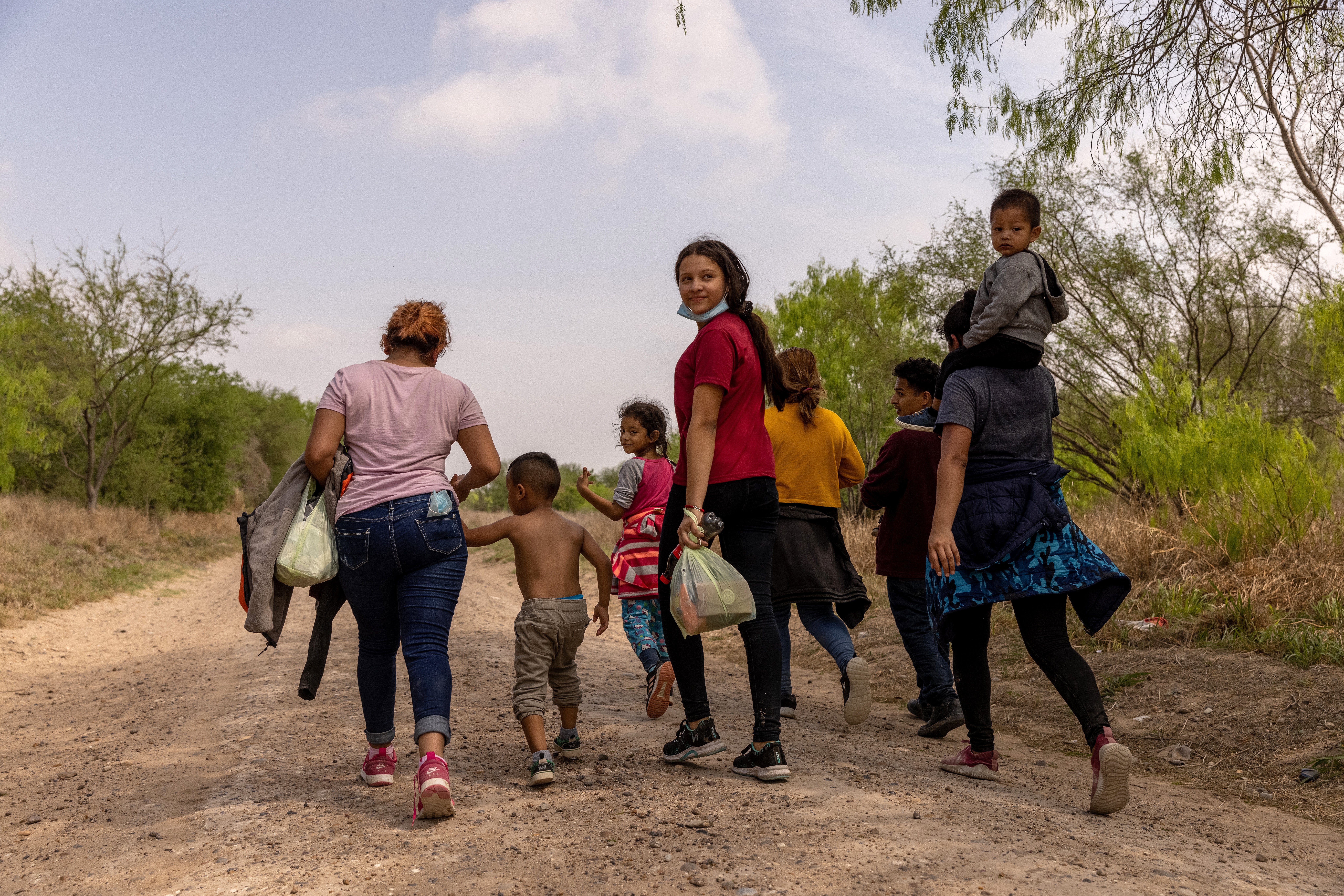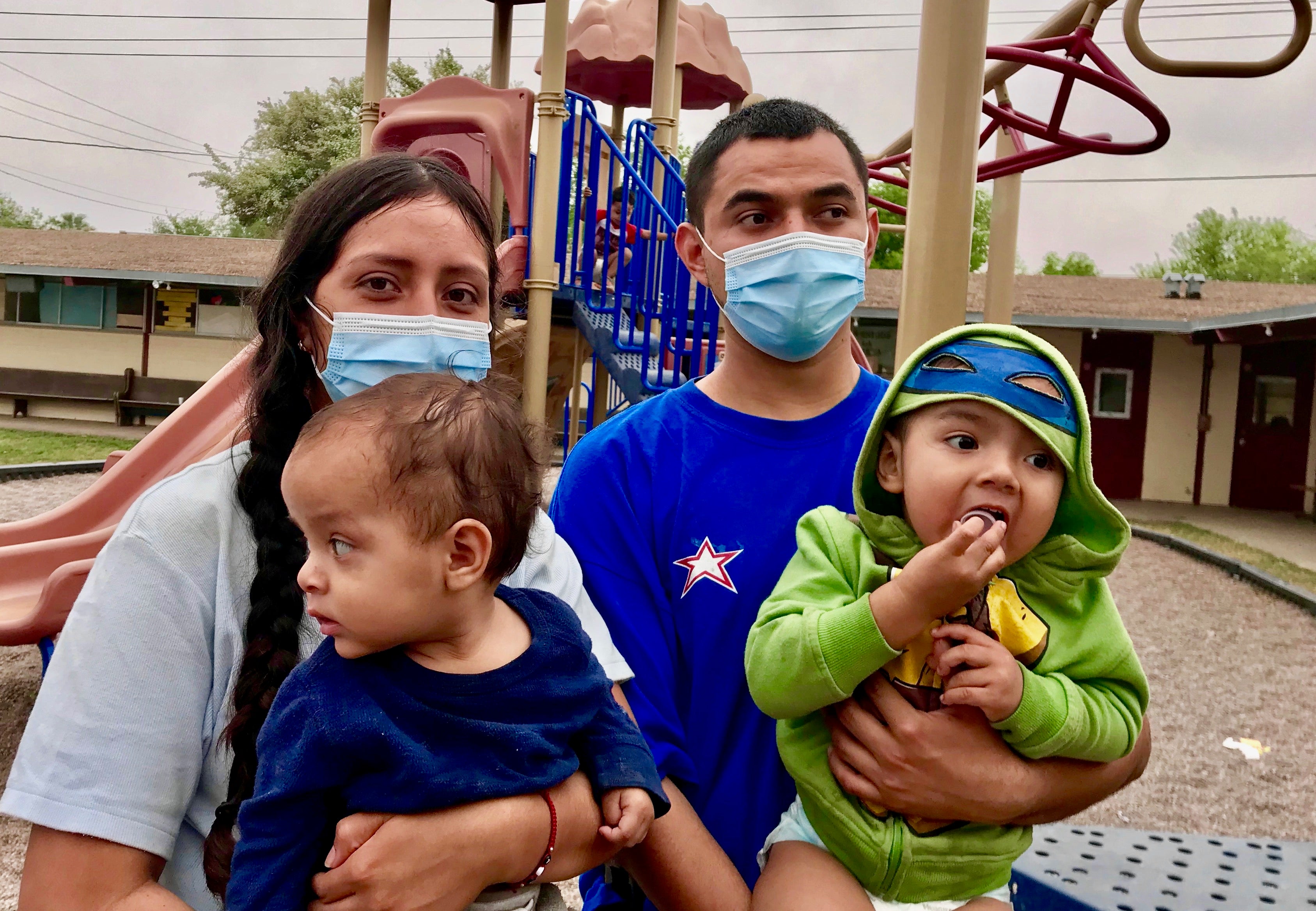‘When Trump was president this was not possible’: Migrants tell of dramatic journeys to reach US as thousands arrive at border
Asylum seekers from Central America tell Andrew Buncombe how they made it to McAllen, Texas, creating a major challenge for Joe Biden


One man from El Salvador demonstrates how he crossed the river in a boat, furiously paddling for the other side and the chance of a better life.
A family from Honduras say they waded across in the afternoon, pushing on even as the water reached their waists. A mother-of-three from Guatemala tells how she had paid $12,000 to a coyote – or people smuggler – to bring her and her daughters on a journey that lasted 23 days, walking, by bus, by “everything”.
They are exhausted, but elated, as they wait in a handful of makeshift facilities run by charitable groups in the Texas border town of McAllen, for the next stage of their journey, to be sent by plane or bus, to relatives dotted across the United States – Los Angeles, Miami, Indiana.
And many reflect their journeys would not have been undertaken were Donald Trump still president; the election of Joe Biden, and his decision to process some, but not all, asylum claims inside the country, has given them hope.
“When Trump was president this was not possible, says Pearla Fernandez Milian, from Salamá, 100 miles to the northeast of Guatemala City. “Biden is good.”
The point is underscored by Albert Solis, who for the past 12 years has worked as a senior pastoral assistant at Our Lady of Guadalupe church in the Texan city of Mission, one of several places helping migrants.
A month ago they started getting 100 people a night, then it fell to 50, and now it is back up to 150. The church operates as an overflow facility when other charities run out of room. He says the church stepped in to help the people, and says many mentioned Biden’s victory last November being a factor in their decision to set off.
“People got the message,” he says. “One group from Honduras told us last week, they had a celebration party the night Biden was elected.”
Immigration experts and activists point out the Biden administration has kept in place large parts of a piece of law, Article 42, enacted by Trump last March, as a means to terminate all immigration to the US on the grounds – disputed by epidemiologists – that the migrants would allow the spread of Covid. Last November a court struck that down, and while keeping in place large parts of Article 42, the Biden administration said it would permit the processing only of unaccompanied minors.
That has created several headaches for the new president. At least 5,000 unaccompanied youngsters are now being held by Customs and Border Patrol families across the Rio Grande Valley, often for days and days at a time, before being handed to the refugee settlement officials. Rules state they should be held there for no more 72 hours.
Earlier this week, the administration scrambled to respond after Texas congressman Henry Cuellar released images of a densely packed children’s facility in Donna, close to McCallen. He told news website Axios the youngsters faced “terrible contains”.
Biden is racing to find additional facilities, in locations such as Carrizo Springs facility, operated by the Department of Health and Human Services, near San Antonio.
It is also asking the Pentagon to try and let it use two military facilities in the state as the numbers of children surge.
Yet it is not just children entering the US. The Independent saw family groups, including fathers, being helped by the charities before being sent on to their relatives. Hundreds are arriving every day.
And because of the numbers, officials have been releasing many migrants before they have court dates, for their asylum cases. Rather, individuals are required to contact the authorities when they arrive in their new destination, a change “intended to mitigate operational challenges”, according to Customs and Border Patrol (CBP) leaked to the US media.
This does not mean there is no tracking. “It’s almost impossible right now for DHS to hold onto these people because it’ll drain so much of the resources,” Rick Barrera, an attorney for Texas’s Barrera Law Firm, told Harlingen’s KVEO-TV.
“There is significant processing that goes before release. There are multiple relatives’ addresses and places, it’s not just a filling-out-the-form-and-you-get-to-go type of thing.”

Republicans have attacked Biden for being weak on immigration and “opening the border”, after four years of Trump’s hardline policies. And some Democrats and migrants rights’ groups urge the president to try and get ahead of the issue, which appears chaotic and confusing, especially given he vowed his immigration policy would be more humane than that of his predecessor.
Journalists have all but been prevented from entering the facilities, other than a solitary pool reporter who was permitted to accompany White House officials and a congressional delegation to Carrizo Springs.
This week, the president sought to grasp the issue, not only ordering the establishment of more facilities on the border, but appointing vice president Kamala Harris to oversee the government’s efforts and work with various countries, not only Mexico, but El Salvador, Guatemala and Honduras, which account for the vast majority of the migrants.
He said those countries “need help stemming the movement of so many folks, stemming the migration to our southern border”.
“This new surge we are dealing with now started with the last administration, but it’s our responsibility to deal with it humanely,” he added.
“There was a serious spike in people heading to the southern border even in the midst of that [the Trump administration]. That was because there were serious natural disasters.”
The problems most frequently mentioned by those heading from the Northern Triangle nations – poor economy, gang violence, corruption – have only become worse in recent years. Migrants are still trying to escape the impact of Cold War-era civil wars and dictatorships, many of which involved the US, which spent millions undermining democracy movements in places such as Guatemala and Nicaragua.
In recent years, climate change has presented more problems for these countries, bringing severe drought and making farming and agriculture – mainstays of many of the nations – even more perilous. Coffee farmers have been repeatedly devastated by drought.
Sister Norma Pimentel, executive director of Catholic Charities of the Rio Grande Valley, has been providing help to hundreds of migrants.

She says there have been surges in migrant arrivals at various points since 2014, as a result of political changes in the United States. There was was a surge, she says, when Trump vowed to build a wall.
Now she says, speaking outside her offices in McAllen, the Biden administration was allowing asylum seekers who were previously being made to wait in Mexico in dangerous conditions to enter the US, be tested for Covid, and then wait with their families to be processed.
“This is a more orderly process,” she says. “These people have gone to great lengths to get here. They have walked for days – their feet are shot to bits. Some have just had to sleep in the road.”
She disputes those who allege the “border is open”. She says it is not, but that human traffickers and coyotes were telling people “now is the time” to come. “They are just exploiting them,” she says. As she speaks, a man passing in a car shouts from his window: “Send them back.”
At Our Lady of Guadalupe church, Alejandro Valle Borohosa, says he spent 18 days travelling with his wife and two children from La Libertad in the north of El Salvador, a country that has one of the highest murder rates in the world. He demonstrated how he and others had paddled across the river.
“There were 20 people in the boat,” he says, saying they are to join relatives in Los Angeles. He says he has just one pair of trousers and shoes, and that it had been a mixture of emotions when they said goodbye to his mother, hoping for a new future. “She was sad, but also happy,” he says.
Javier Villanueva, his wife, Dilcia, and their two children, are also waiting for the next stage in their journey.
They have travelled from Tocoa in northern Honduras, by foot and by bus. They had left their home a month ago, without the help of a coyote.
“We did not have the money,” he says. Villanueva says that he has faced problems not only from gangs, but from the police, who had beaten his 15-year-old son, Sixto.
“Everywhere in the country is dangerous,” says Villanueva, who worked as a truck driver delivering water. He says there are no proper jobs, no future for his two children.
He says that the change in government in the US was a factor in their decision to travel now.
The family walked across the Rio Grande. His wife Dilcia, points out how the water came up to their waists, as they walked across in the afternoon. “Yes. We were frightened.”
The family is waiting on a final piece of paper for their youngest, four-year-old Elthon, before they travel to join a friend who lives in Jacksonville, Florida.
Villanueva points to his children and smiles about the prospect of them being able to go to school, having safety, enjoying a better life. “This is about the children.”
Join our commenting forum
Join thought-provoking conversations, follow other Independent readers and see their replies
Comments
Bookmark popover
Removed from bookmarks